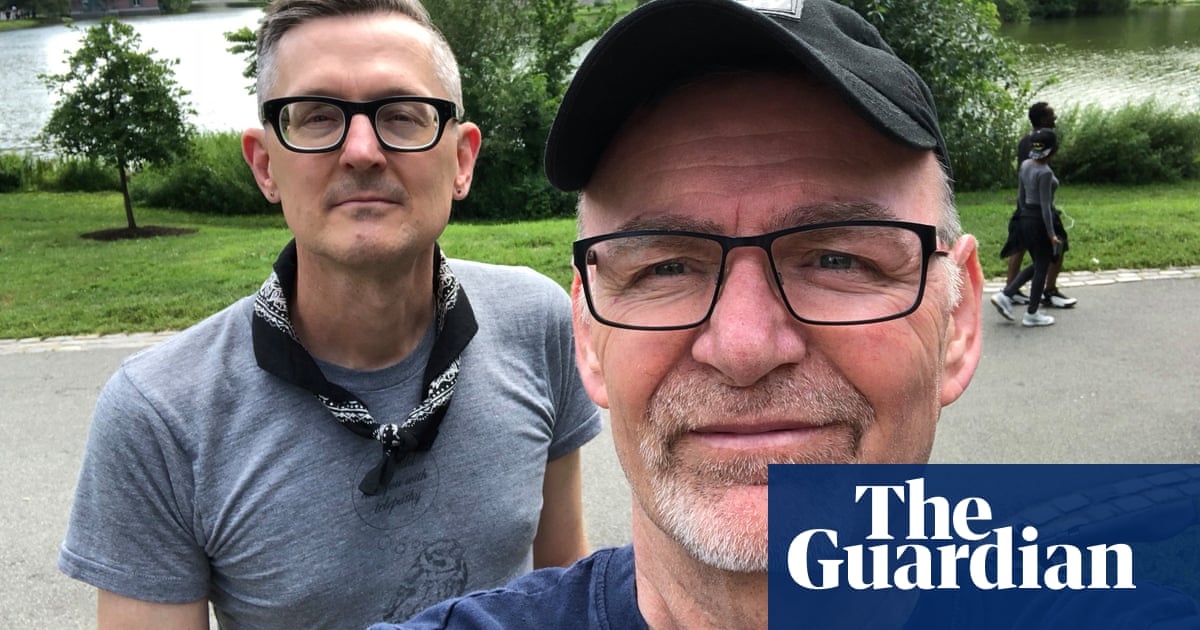
Stanley Donwood I can’t believe the innocent world we lived in when we were making this work. It was before 9/11, before the “war on terror”, before the conjoining of the police and the military – all of the social changes that have led towards the position we now find ourselves in. It wasn’t possible to know what was going on around the world in the same way that it is now, when news has become a sort of surrogate entertainment.
Thom Yorke Everybody involved felt like we’d been in some weird circus for quite a while, after OK Computer. Personally, I mentally completely crashed, as did Stan. We all did, in a way. Rather than immersing ourselves in this congratulatory atmosphere around us, we felt the total opposite. There was this fierce desire to be totally on the outside of everything that was going on, and a fierce anger, and suspicion. And that permeated everything. It was completely out of proportion, deeply unhealthy – but that’s where we were at.
SD There was a lot of jingoistic triumphalism in popular culture.
TY We felt that there was a sort of uncomfortable shift in awareness going on. Maybe that was the fairly rapid disillusionment with Tony Blair: all the Cool Britannia nonsense, and all the artwork – the kind of thing that was called “Brit art”, and the YBA phenomenon that preceded that period … it just didn’t speak to us. The phrase “spin with a grin” was flying around at the time, because of the aggressive and self-serving PR tone coming out of the New Labour government. It was a strange new phenomenon to behold, and one now taken for granted: an obsession with how one looks rather than what one does.
SD There was a lot of disappointment about integrity, or lack thereof, pertaining to Tony Blair.
TY We wanted to build a studio, and it wasn’t ready, so we went on this very strange trip to Paris, and we went to this exhibition …
SD David Hockney in the Pompidou. Incredible. It was just basically loads of canvases, but felt like you were in something the size of the Grand Canyon. And that’s what kicked the whole thing off: let’s make these massive landscapes, these epic things.
TY And then we were in Cornwall, all inspired by Hockney, wandering out on to the moors; do you remember this?
SD It was freezing.
TY Bitter cold. And we only had all the wrong colours, and these big canvases …
SD I thought it would be really funny if we painted just in shades of blue and purple.
TY We sat down in this stone circle, and we were painting for ages. And this old couple came and talked to us: “Oh, what are you doing?” They were looking forward to looking at our paintings. And they were all fucking … blue and purple. And they walked off without saying anything.
I’d had a complete creative block, and Rachel, my partner at the time, had said: “Stop trying to make music. Stop completely for a while.” So I was wandering around just drawing anything I could see. Landscape. So landscape became an extremely important part of what was going on, because it loosened me up.
SD Just creating a world in which you can tell a story. I felt like I was just full of stuff that I wanted to get out: all these ideas, all these interpretations of current affairs, politics, history. But it felt like you couldn’t do it in isolation: you had to build some sort of structure that it would make sense in, otherwise you’d just be a loony on a bus.
TY You can pick up either of our sketchbooks at the time and both the monologues are perpetually self-destructive. So the act of sitting down in front of a landscape and just trying to represent that in whatever way we felt – choosing to listen to that and not any of the shit in your head – was a massively freeing experience. I spent a lot of time alone, trying to get rid of this self-destructive noise in the head … But this one was like a tortuous journey from almost total gridlock: complete lack of confidence, complete cynicism in our own success, not feeling in any way connected culturally with what was going on in our own country, but at the same time being aware that we were in a really privileged position.
SD And at the same time I was sort of consumed with a sort of a gnawing concern that …
TY … it was all bollocks. Approaching every day as if we’re total bluffers and someone’s going to find us out at any moment.
SD So, no change there.
TY There was no map. We just were trying to be very, very instinctive.
SD It felt like if a method was developing, that was a bad thing. If you’re doing things by a method you just end up with the same result in different iterations. We were trying to destroy methods, to destroy habit. Basically, really perversely trying to make things as difficult as we could all the time.
TY I don’t think we needed to try. It’s just what we do.
SD The two records to me, in my head, felt very different. Kid A was these increasingly urgent answerphone messages left on a phone that no one ever listened to, and Amnesiac – I had this idea that Amnesiac was songs that had been left in a drawer in an old dusty chest of drawers that had been left in an attic. So both of them were kind of … kind of crying out for attention, but had been forgotten. I was spending a lot of time in London … I think I went a bit mad, because I did start to think that London was a kind of prison.
TY I don’t know why you started drawing minotaurs; I don’t know why that started.
SD The labyrinth.
TY He was banging on about this all the time, the labyrinth thing.
SD I was obsessed with it …
TY On and on and on he went. And it really formed part of what was happening. The minotaur cursed to repeat its mistakes in a maze. We had this whole plan worked out for this ziggurat, where people could log on, and build a room in the ziggurat themselves, and leave messages for other people …
SD And they had to use a certain number of characters. We basically invented Twitter before Twitter, and failed to make any money from it.
TY It was called the Byzantine Ziggurat. But we didn’t want anyone’s data, therefore it was never going to work.
SD I was a real evangelist for the internet in the beginning; I thought it was going to be amazing. I thought it was going to be like Gutenberg’s movable type; it was going to revolutionise the world, and it did, only in a way that I didn’t foresee. It’s become the worst thing that you could imagine.
TY But going back to the artwork and the music: to me, the creatures in the Amnesiac artwork really felt like the abstracted, semi-comical, stupidly dark, false voices that battled us as we tried to work. Personifications of the mood of the time, that flowed in and out of the songs and writing. The faceless terrorists; the self-serving politicians; corporate bigwigs hugging.
The nature of being a songwriter, or a painter, or whatever, is to retain a beginner’s mind. The search is the point. The flailing around is the point. The process is the point. I like being given material and maybe finding a narrative that someone else doesn’t see. I like when [Radiohead guitarist] Jonny gives me a piece of material, or Stan gives me a bit of writing, and I say: “This bit, and this bit.” And then likewise that will get done to me. Stan is very good at being able to see something in something I did that I was literally about to bin. That means you’re always working beyond what you expect.
SD It’s much more productive working with other people than it is working alone, I think.
TY Yep. Always. The simple fact that we never even thought it was a problem to paint on each other’s paintings, and write on each other’s writing …
SD We would start on two canvases next to each other, and after a certain amount of time, swap over and start working on the other one. And basically keep doing that until someone had … “won” the painting.
TY Always him.
SD Yes, but I’m not very good at music, so it’s fair. And with the writing as well, it was a very kind of like … back and forth. I tend towards a very over-meticulous, over-detailed, slightly anally retentive style of writing – and drawing and painting as well. And Thom’s sort of the opposite.
TY I’d be going off on one in all directions, flailing around, experimenting with lots of different things, not even worrying whether it was going to be lyrics or not. And Stan was doing the same; Stan had also been writing short stories, and that was influencing me as well. It spiralled.
I would like to think that the freaky nature of how we went about doing all of this, for anybody that’s interested; I hope it inspires a way of celebrating this idea of process. Just to let the boat drift and see where it’s going to go. Don’t jump out; just see where it goes. Not necessarily wanting end results; not necessarily trying to get to an end point. That’s really important to me.
Out of the first world war, and out of all the positivism of the industrial revolution, there was this disillusionment in the 1920s, right? You had this terrible Spanish flu, millions of people dying … and at some point it lifts. It all lifts, and then you get the roaring 20s. You get this explosion in music and art and film. What’s really interesting is that we’re witnessing on one side a determination by certain states, like Britain, to engage us in some horrific kind of doublethink. Being told how wonderful everything is when literally thousands of people are dying every day. Being told by the government how well they’re doing. That’s what we’re ingesting.
But we’re also desperate for something real and true that speaks to us. People have been reading more. They’ve been watching films more. I feel that there’s going to be a massive reaction. Kid A and Amnesiac are, if nothing else, a celebration of what is possible when a bunch of people get together and forget about everything except trying to create work that speaks to them at that moment, in a sort of frenzied, last-days-on-Earth kind of way. I don’t know why we thought it was the last days on Earth, but I guess we did; it was the millennium, whatever. But that kind of madness is important. That’s certainly how I’ve seen it, digging through this stuff, going: “Who are these people? They need help,” but at the same time being really proud of that room of people doing it.
We finally applied our training. The only thing I would have said to me then – to all of us, but especially me – is, that voice in your head that’s telling you to torch the tapes and walk away, that everything you’re doing is shit? You need to give that guy a firm talking to. You think he’s helping you out, but he isn’t.
SD I can’t believe I was such a fucking pessimist. Now that global warming has been sorted out and all conflict has been resolved, my gloomy take on existence seems ludicrous.












